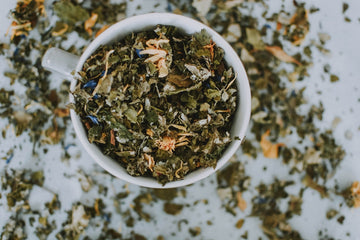Humans have been making tea for thousands of years. It is an essential part of the daily lives of many individuals, and it is a pathway for medical treatment. It has long been associated with improving the health and mood of regular tea drinkers, but how true is this phenomenon exactly? Is it just the flavors giving a boost of pleasant feelings, or is there any science to support this belief?
The answer: Yes. Everything from teatox cleansing to teas that boost energy have some sort of science behind its viability. In this article, we will talk about how tea interacts with the brain to heighten awareness and focus attention. We will go over the cognitive benefits of tea that have been known to help maintain focus in a person.
What happens when the brain tries to focus attention?
When a person gives something their attention, their brain goes into a heightened state of awareness to deal with a specific source of information. All the senses and cognitive processes of their brain work together to analyze this information and retain what is relevant about it.
It is an important aspect of many brain functions, such as memory and reasoning. It is also an important determinant of the speed of responses, reflexes, and so on.
The bioactive compounds in tea
Experiments have discovered that the most important chemicals in tea for boosting attention and focus are caffeine and theanine. The average cup of tea contains 31–61 mg of caffeine and 4.5–22.5 mg of theanine. It has been theorized that polyphenol epigallocatechin-3-gallate or EGCG has some neuroprotective effects, but its connection to attention and cognitive functions is yet to be determined through experimentation.
How caffeine boosts attention
Caffeine interacts with the brain by competing with adenosine in the body. Adenosine is a hormone that binds with receptors in the brain. Once it does, neural activity begins to slow down. However, when caffeine is consumed, it will overtake adenosine in the body to bind with these receptors, blocking that slowdown in neural activity.
Not only that, but caffeine also interacts with receptors in the dopaminergic system, causing the release of neurotransmitters such as noradrenaline, acetylcholine, serotonin, glutamate, and y-aminobutyric acid. Not only are these known to boost higher-order attentional processes, but they are also known to boost arousal and sexual desire.
How theanine affects attention
Theanine is an amino acid that is unique to tea, found in nearly every type (even the ones used for teatox cleanses). It is metabolized into glutamic acid and ethylamine and has been known to reduce other amino acids (such as tryptophan and tyrosine) in the brains of many mammals. These amino acids are the building blocks of many hormones responsible for regulating brain function.
While these hormones are responsible for some high brain and attentional functions, the reduced capacity actually increases the sensitivity in many receptors. In essence, as the supply of these amino acids goes down, the demand goes up. That means that theanine perhaps reduces the attentional capacity in the short term temporarily while increasing it in the long term.
Final thoughts
Tea is one of the most beloved beverages in all of human history, so there should be no surprise that the science behind its effects has been examined in great depth and detail. One thing the science agrees on: Tea is good for you, and it is perfectly acceptable and healthy for the body in the long run so long as the rules of moderation are followed.
For teas used in teatox cleanses, brain boosting, colon cleaning, and so on, send us a message at Tea Tox Life. We have a wide selection of different products for improving all manner of bodily functions, systems, and organs.
